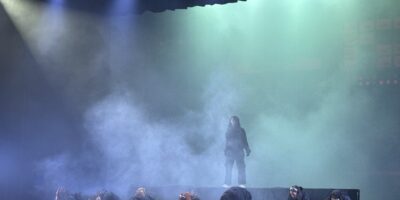When I think of Philip Seymour Hoffman, I think of Lester Bangs. I think of the short, unruly brown hair, the Ray-Ban shades shielding his eyes from the glare of the Californian sun, the long-sleeved leather jacket worn over a faded, red The Guess Who t-shirt, and that voice—that gravelly, matter-of-fact voice trashing the 70s’ music scene, the voice of the man who decided to play Iggy Pop at a music station when “it’s a little bit too early” in the day. I think of his words on music, his now-iconic gospel on what it means to be “uncool,” and his advice on journalism, on “being honest and unmerciful,” as a journalist, the advice which has stuck to me ever since the first time I watched Almost Famous (2000). It’s a Cameron Crowe script, but it took Hoffman to create the real magic in the film, to bring the real life character of Lester Bangs from the pages and to cement him as a role which has profoundly impacted those “uncool” kids and inspired many would-be journalists, including this one.
Hoffman’s scenes, though few, were at the film’s most pivotal moments, and it was his character that stood out the most in the film for me. I have loved him in the role. I have loved him for giving us Lester Bangs, for his influential performance despite having the flu during the entirety of his scenes, and for bringing meaning to and being the soul of a film about getting lost in the so-called glories of rock n’roll.
You can imagine me, shocked and shaking my head in disbelief, when I had found out the news, that Sunday afternoon, on February 2, that Hollywood, the world, and us, his audience, had lost him forever. It took time to for the horrible news to sink in. My twitter feed was blowing up with people expressing their sadness for the loss, a death that felt more to us like “a robbery,” as one critic put it, than anything else. He was 46, a seasoned, fixed figure in the acting world’s panel of character actors.
Hoffman’s body was found in his West Village, Manhattan apartment. Reports explained the cause of death to be a drug overdose. A heavy drinker and drug user during his time at New York University’s Film School, Hoffman had parted with his vices early in his acting career and had remained sober for more than 20 years, until he checked himself into rehab last Fall. An insider told Rolling Stone magazine that his check-in followed his demanding Broadway role as Willy Loman, a salesman so disillusioned with his hopeless life that he was caught in between reality and fantasy, in a revival of Arthur Miller’s Death of a Salesman, one of my favorite plays. Hoffman was a character actor whom directors had often praised for his honest portrayal of characters and for effortlessly slipping into his roles. Repeated performances as Loman, night after night, had no doubt affected him.
Yet he was more than Lester Bangs, a supporting character, and more than Willy Loman, the crucial leading man. Hoffman was fearless, committed, and dedicated to his craft, a force irreplaceable by others in the entertainment industry. His characters were so human, so real, I could not help but to empathize with them, to feel their sufferings, their troubles, be it a loser, a creep, an addict, or a writer, and even to glimpse their lives through Hoffman’s soulful eyes. There’s much to look back in Hoffman’s eclectic mix of roles in his filmography, and, as I recently took myself on the journey after I heard the news of his passing, we remember the highlights of his career.
Hoffman collaborated with arthouse filmmaker, Paul Thomas Anderson, multiple times. Many regarded his Boogie Nights (1997) role as Scottie J., the shy, clumsy boom-operator who fell head over heels for Mark Wahlberg’s Dirk Diggler, an adult film star, as his breakout role. Hoffman played his character with such an earnest naiveté that I ended up pitying this poor minor character, when he locked himself in his car after a failed love confession, repeating “I’m a f***ing idiot,” in anguish, over and over. Hoffman followed this up with a role in Magnolia (1999), as one of the characters entangled in the dramas of Magnolia Avenue, San Fernando Valley, a film which he claimed to be his best. His “shut-up,” scene with Adam Sandler’s character in Punch, Drunk, Love (2002) is one of the most memorable film scenes of all time, from the way his character escalated from mere irritation to exploding anger in a matter of a few minutes. (There’s a similar “shut-up” scene, said to have been inspired by this one, in Breaking Bad (2008-2013), a performance flawlessly done and heartbreaking to watch from Anna Gunn (Skyler White).) And of course, who could forget his fourth and final Oscar-nominated role as Lancaster Dodd, the lord of a cult in The Master (2012), opposite Joaquin Phoenix, as the unsettled Naval veteran who became involved in the cult?
Another haunting role of Hoffman’s is his character, Andrew “Andy” Hanson, in the director of the classic 12 Angry Men, Sidney Lumet’s final film, Before the Devil Knows You’re Dead (2007). Hoffman starred as a real estate accountant and secret heroin addict, driven so hard into a corner which he can find no way out, that he goads his younger brother, Hank (Ethan Hawke), into robbing their parents’ jewelry store. When a slip-up in the plan triggers a chain of unexpected events that sink the brothers into deeper troubles, Andy starts to spiral out of control. Hoffman’s Andy carries himself through the film’s non-linear storyline with tormented eyes and a voice revealing of his fragile grasp on his inner demons. It was difficult to watch him struggle, to see him lay on the bed, being injected heroin and musing, heartbroken, to his indifferent drug supplier, how his parts “don’t add up to one me,” a vivid portrait of a broken man on the verge of slipping into mental instability, a man disconnected from even himself.
A role impossible to not mention is Hoffman’s Oscar-winning depiction of the Breakfast at Tiffany’s writer and celebrity, Truman Capote, in Bennett Miller’s Capote (2005). The film tells the story of Capote during his six-year research for his non-fiction crime novel, In Cold Blood, and his association with one of the case’s murderers, Perry Smith (Clifton Collins Jr., or, as you may know him as Pacific Rim’s (2013) Ops Tendo Choi, in a performance which blew me away). It’s not just the way Hoffman had transformed himself, in spite of his lack of resemblance to Capote— it’s his shrill voice, his mannerisms and hand gestures, his vanity and the ease with which he glides through the scenes, laughing here and there with a martini glass in his hand. His Capote is also the man behind the façade, the man who reveals his true self only in private with his co-researcher and childhood friend, To Kill a Mockingbird writer Harper Lee (Catherine Keener), the man excited by the prospects of his book coming together, the man determined and tenacious in his pursuit for information. Hoffman had made the role of Capote his own, and for that, he was the film’s very essence.
On a lighter note, Hoffman’s turn as the posh Princeton alum, Freddie Miles, in Anthony Minghella’s thriller, The Talented Mr. Ripley (1999), is a favorite of mine. The film, based on a novel by Patricia Highsmith, takes the audience inside the mind of a serial killer and impersonator Tom Ripley (Matt Damon). “Come stai?” Freddie asks, cheerful and boisterous, as he bursts out of a red Alfa Romeo sportscar, in one of the most iconic character entrances in films. Hoffman’s Freddie, a hedonist luxuriating in the world’s sins, spots Ripley as a poseur from the moment they meet, and steals every scene he’s in afterwards. His final confrontation with Ripley, from his scrutinizing, suspecting eyes, his teasing tricks with the piano keys, to his priceless facial expressions, all directed at Ripley, was brilliantly done. I could not have loved him more.
In between the roles mentioned, Hoffman appeared in theater productions, such as his role as James Tyrone Jr. in Eugene O’Neil’s A Long Day’s Journey into Night (2003), in indie films, some good, some mediocre, and even blockbusters. Some may remember him as the villain, Owen Davian, from Mission: Impossible III (2006), as the journalist Freddy Lounds in Red Dragon (2002)—a performance which Anthony Hopkins (Hannibal Lecter himself), who shared no scenes with Hoffman in the film, came to watch on his days off—or as Plutarch Heavensbee, the Capitol’s new Gamemaker, in Hunger Games: Catching Fire (2013).
Still to come are his roles in Anton Corbijin’s thriller, A Most Wanted Man (2014), John Slattery’s drama, God’s Pocket (2014), both of which were screened at the 2014 Sundance Film Festival, and, of course, Hunger Games: Mockingjay, Part I (2014). He had seven days of filming Part II (2015) left before his death, but the films are to be released on schedule, according to the distributor, Lionsgate.
Hoffman was a true artist, an actor who gave himself fully to each role so we can meet the human behind each character. I will treasure the performances he gave, the feelings they evoked, and the moments I felt a piece of myself lost to his characters. You will truly be missed, Mr. Hoffman, for there is no other like you.




Leave a Reply